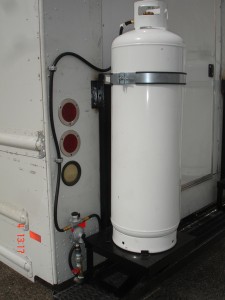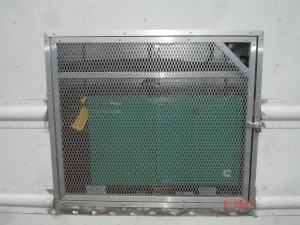 Fire Safety Licensing
Fire Safety Licensing
You will undoubtedly come across fire safety regulations. Unfortunately, food trucks can be perceived as mobile bombs, especially public perception. Assuming you have a food truck that’s been built with the correct safeguards in place this is an exageration. But with that said, it is important to take safety seriously. This is your business and livelihood. There have also been some recent examples like this news report of a food truck exploding that highlights the responsibility food truck owners and manufacturers share for public safety.
There are a lot of potential fire safety issues on board a food truck including: propane tanks, generator, kitchen equipment, and various electrical equipment. At the very least you’ll be required to buy a general fire extinguisher, a grease fire extinguisher (K class), and you may need a fire suppression system for your kitchen equipment.
The cost of each of these safety measures varies, for instance a general fire extinguisher may cost about $40, a K class extinguisher could be around $300, and a fire suppression system could be >$1000. Again, knowing the rules could impact your spending and setup, so plan accordingly.
There is a lot of technical jargon out there, that may make it frustrating to understand what is expected of you. Here are some references that may help you cut through the jargon. First is an article that explains the classification system for fire extinguishers. And here is an article that describes the UL300 standard for fire suppression systems.
In Albuquerque as an example here are the specific requirements needed:
|
You will want to speak with your fire safety governing body, most likely your local fire marshal’s office. Again, your city hall will have information relevant to these regulations.
Liquid Propane (LP)
Liquid propane is most likely going to be the fuel source for your cooking equipment. There may be regulations in your state/city to ensure the proper handling of the LP equipment on your truck. This is definitely not guaranteed though. And the governing body regarding these safety regulations may vary from city to city and state to state.
For instance, your local fire marshal may have jurisdiction here or there may be a separate body like what is established here in New Mexico (the aforementioned Propane Police).
| When we were researching regulations to ensure compliance for our fire safety inspection, we specifically asked the fire marshal’s office about propane tank installation and any other considerations. Because there was some miscommunication between the fire marshal’s office and the office regulation body (the LP Gas Bureau aka Propane Police), we actually received incorrect information from the fire marshal’s office! If it wasn’t for that fateful day at Ortega’s Propane Supply we would not have had an easy start to our food truck career. So be sure to ask a lot of questions while you are still in the startup phase of your business, and make sure you have as many answers as possible. |
General Liability and Commercial Auto Insurance
You will absolutely need insurance for your food truck. Specifically, you will be looking for General Liability coverage and Commercial Auto coverage. Commercial Auto is basically the business equivalent of your personal automobile coverage. It ensures that you are covered in the case of driving incidents and motor vehicle collisions. General Liability coverage on the other hand will cover your business (and you as an extension) for any business related incidents. An example of this type of incident would be lawsuits, workplace accidents, or fire damage, among other things.
The insurance options available to you will vary by location. Here in NM, my options were limited. In fact, I only had one option available to me when I purchased food truck insurance. Luckily, my agent was able to provide both types of coverage. Back when I was researching the industry, I had to receive a quote from separate companies for each type of policy individually.
Now that food trucks are much more prevalent, there are a growing number of food truck insurance providers. Shop around for the quote and policy that best suites your needs. Talk with insurance agents about what types of coverage there is and ask them to explain your policy in plain english.

